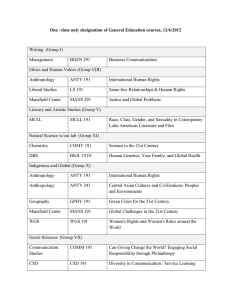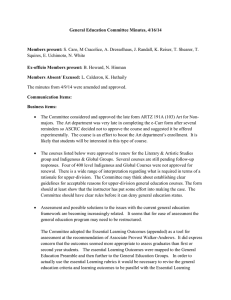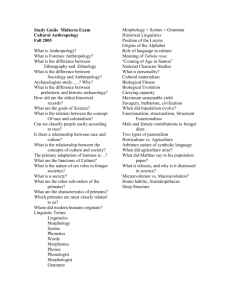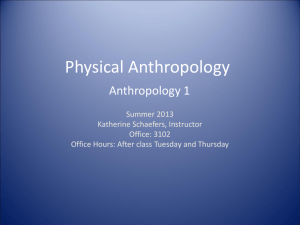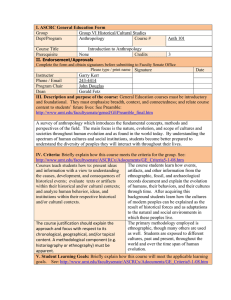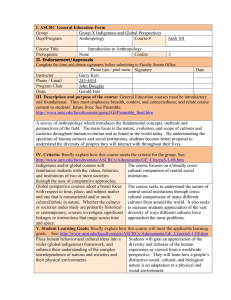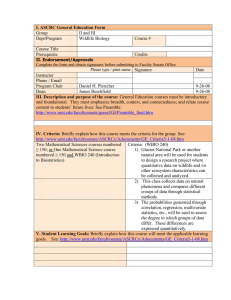Use to propose new general education courses (except writing courses),... gen ed courses and to remove designations for existing gen...
advertisement
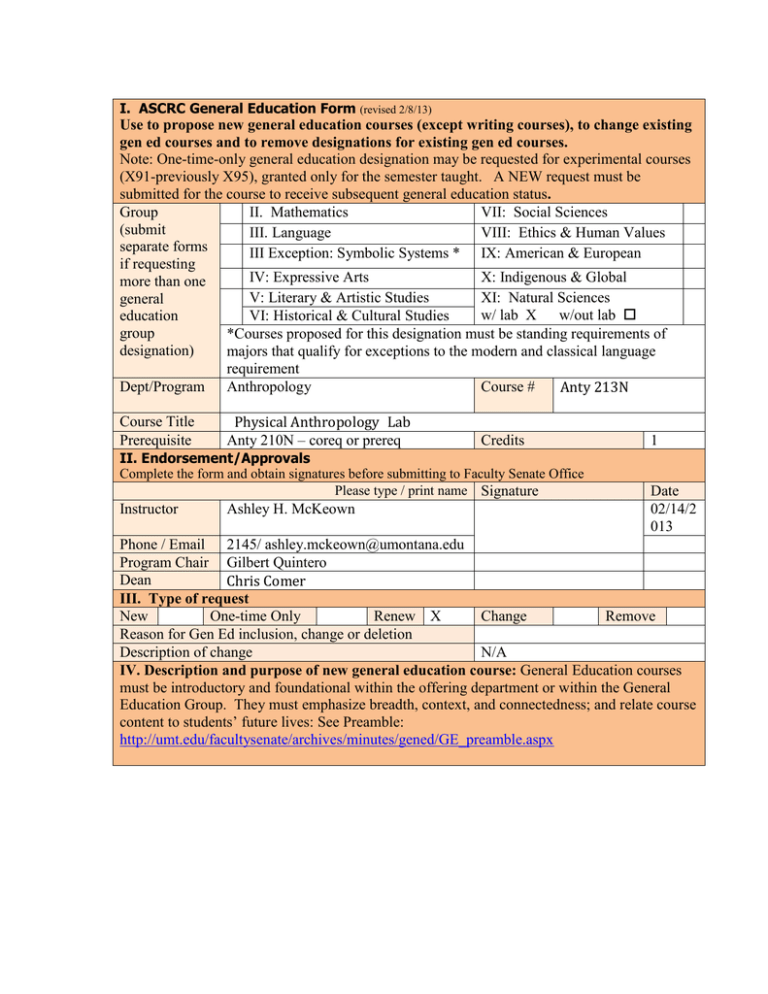
I. ASCRC General Education Form (revised 2/8/13) Use to propose new general education courses (except writing courses), to change existing gen ed courses and to remove designations for existing gen ed courses. Note: One-time-only general education designation may be requested for experimental courses (X91-previously X95), granted only for the semester taught. A NEW request must be submitted for the course to receive subsequent general education status. Group II. Mathematics VII: Social Sciences (submit III. Language VIII: Ethics & Human Values separate forms III Exception: Symbolic Systems * IX: American & European if requesting IV: Expressive Arts X: Indigenous & Global more than one V: Literary & Artistic Studies XI: Natural Sciences general w/ lab X w/out lab education VI: Historical & Cultural Studies group *Courses proposed for this designation must be standing requirements of designation) majors that qualify for exceptions to the modern and classical language requirement Dept/Program Anthropology Course # Anty 213N Course Title Prerequisite Physical Anthropology Lab Anty 210N – coreq or prereq Credits II. Endorsement/Approvals Complete the form and obtain signatures before submitting to Faculty Senate Office Please type / print name Signature Instructor Ashley H. McKeown 1 Date 02/14/2 013 Phone / Email 2145/ ashley.mckeown@umontana.edu Program Chair Gilbert Quintero Dean Chris Comer III. Type of request New One-time Only Renew X Change Remove Reason for Gen Ed inclusion, change or deletion Description of change N/A IV. Description and purpose of new general education course: General Education courses must be introductory and foundational within the offering department or within the General Education Group. They must emphasize breadth, context, and connectedness; and relate course content to students’ future lives: See Preamble: http://umt.edu/facultysenate/archives/minutes/gened/GE_preamble.aspx This course is a Natural Science Lab course that will be taken in conjunction with (or after) Anty 210N Introduction to Physical Anthropology. This lab allows students to explore the concepts and materials discussed in Anty 210 in a lab setting, reinforcing the information covered in the large lecture section and satisfying the General Education Natural Science lab requirements. Anty 210N Introduction to Physical Anthropology introduces the major subfields of physical anthropology, including human genetics and processes of evolution, biology and behavior of non-human primates, human evolution, and modern human adaptation and variation. As Anty 210N provides students with information regarding the biological history and current condition of Homo sapiens within a biocultural and evolutionary framework, Anty 213 allows students to acquire a deeper understanding through hands on applications, hypothesis generation and testing, and the production of scientific reports. V. Criteria: Briefly explain how this course meets the criteria for the group. See: http://umt.edu/facultysenate/documents/forms/GE_Criteria5-1-08.aspx Courses explore a discipline in the natural The co-requisite course (Anty 210N) sciences and demonstrate how the scientific explores the field of physical anthropology, method is used within the discipline to draw which is primarily concerned with scientific conclusions. understanding the human condition from a biocultural perspective within an evolutionary framework. As the various topics are discussed, students in Anty 213 discuss and implement the scientific method to develop evolutionary based explanations for the presence of biocultural variation among and within human populations. Courses address the concept of analytic This lab course is specifically designed to uncertainty and the rigorous process required to teach students the process by which take an idea to a hypothesis and then to a hypotheses are generated and tests and validated scientific theory. scientific theories are validated. The concept of analytic uncertainty is inherent in this process and will be explored throughout the lessons. Lab courses engage students in inquiry-based All lab activities are based on the process of learning activities where they formulate a scientific inquiry and will involve empirical hypothesis, design an experiment to test the observations, hypothesis generation, hypothesis, and collect, interpret, and present hypothesis testing through data collection the data to support their conclusions. and analysis, and the presentation of the process and results in a lab report. VI. Student Learning Goals: Briefly explain how this course will meet the applicable learning goals. See: http://umt.edu/facultysenate/documents/forms/GE_Criteria5-1-08.aspx 1) understand the general principles associated This lab course will reinforce the material with the discipline(s) studied introduced in the co-requisite lecture section (Anth 210N) including the general principles of physical anthropology and allows specific applications of those principles to understanding biocultural aspects of human and non-human primates within an evolutionary framework. 2) understand the methodology and activities scientists use to gather, validate and interpret data related to natural processes This course allows student to employ the methods and activities scientists to use to study the biocultural aspects of humans and non-human primates within an evolutionary framework. 3) detect patterns, draw conclusions, develop These activities are incorporated into each conjectures and hypotheses, and test them by class meeting. Students explore human appropriate means and experiments heredity, human evolution, human adaptation and the biology of non-human primates through scientific inquiry. 4) understand how scientific laws and theories Each class meeting addresses the scientific are verified by quantitative measurement, method and students employ it to learn the scientific observation, and logical/critical theoretical foundations of physical reasoning anthropology. 5) understand the means by which analytic This lab course is specifically designed to uncertainty is quantified and expressed in the teach students the process by which natural sciences hypotheses are generated and tests and scientific theories are validated. The concept of analytic uncertainty inherent in this process and will be explored throughout the lessons. VII. Justification: Normally, general education courses will not carry pre-requisites, will carry at least 3 credits, and will be numbered at the 100-200 level. If the course has more than one pre-requisite, carries fewer than three credits, or is upper division (numbered above the 200 level), provide rationale for exception(s). VIII. Syllabus: Paste syllabus below or attach and send digital copy with form. The syllabus should clearly describe how the above criteria are satisfied. For assistance on syllabus preparation see: http://teaching.berkeley.edu/bgd/syllabus.html Please note: Approved general education changes will take effect next fall. General education instructors will be expected to provide sample assessment items and corresponding responses to the Assessment Advisory Committee.
